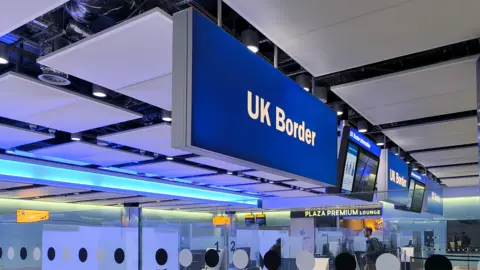The recent report from the Public Accounts Committee (PAC) has raised significant concerns regarding the Home Office’s inability to track the departure of foreign workers from the United Kingdom once their visas expire. This revelation comes amidst ongoing debates about the effectiveness of the UK’s immigration system, especially following the introduction of the skilled worker visa route in December 2020. The report highlights a gap in the Home Office’s ability to gather vital information about visa overstayers, which is critical for managing the country’s immigration effectively.
According to the PAC, the Home Office has largely neglected to analyze exit checks ever since the introduction of this visa route, a situation that has led to uncertainty about whether foreign workers leave the UK upon the expiration of their visas or remain in the country to work illegally. This lack of data gathering has raised questions about the government’s commitment to monitoring and addressing immigration issues effectively, particularly in the context of a burgeoning visa application rate, with approximately 1.18 million applications received between the visa’s launch and the projected end of 2024.
The Home Office has attempted to address concerns about border security by indicating that it is in the process of modernizing its checks and boosting digital measures to effectively monitor the goings and comings of international workers. Despite these claims, the BBC has sought further clarification from the Home Office regarding the PAC’s report but has yet to receive a response.
It is essential to note that the skilled worker visa route replaced the previous Tier 2 (General) work visa following the UK’s departure from the European Union. This new framework was introduced to fill skill shortages, particularly in sectors like health and social care, which have faced significant challenges in the wake of the COVID-19 pandemic. Following the expansion of this route in 2022 to accommodate pressing need for labor, the resulting increase in net migration to historically high levels has fueled political contention and calls for stricter immigration controls.
The PAC’s critique of the Home Office extends beyond mere data collection; it suggests a broader complacency regarding the operational effectiveness of the visa routes available for foreign workers. The PAC has expressed concern that the department displays “little curiosity” about the circumstances of foreign workers after their visas expire, which raises fears of potential exploitation. A particularly alarming finding from the committee’s report indicated “widespread evidence” of foreign workers experiencing debt bondage, excessively long working hours, and exploitative employment conditions. Furthermore, the Home Office has been labeled as “slow and ineffective” in implementing measures to confront and combat such exploitation.
In a bid to mitigate rising net migration figures, Home Secretary Yvette Cooper announced plans in May to cease overseas recruitment for care workers, reflecting a broader governmental strategy to manage the pressures of immigration. The situation has prompted discussions regarding the economic implications of reducing foreign labor influx in vital industries. Dame Antonia Romeo, the Home Office Permanent Secretary, acknowledged that visa overstaying is indeed a persistent issue that the department is attempting to rectify.
The PAC’s critique and its implications for future immigration policy have ignited significant discussion surrounding the effectiveness of the UK government in managing its borders and labor market. As it stands, the glaring gaps in data collection and the overarching framework governing foreign workers’ rights and protections suggest that comprehensive reforms may be necessary to ensure that the system operates fairly and effectively. The need for transparent and thorough monitoring mechanisms has never been more urgent, as the dialogue around immigration continues to evolve amidst both economic and social pressures.











